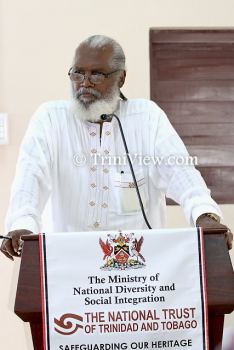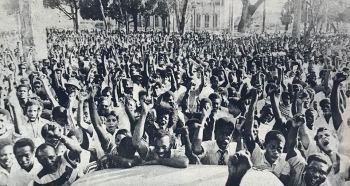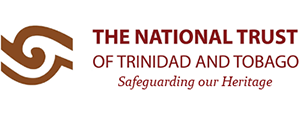A Look at Professor Emeritus Winston Suite
Engrained in the Black Power Movement of Trinidad and Tobago are individuals who contributed and shaped this dynamic period in history. The Black Power Movement was an event which challenged the inequality and racial discrimination against blacks in Trinidad and Tobago. Young, black people in the country, decided to take action against institutions and structures, who they believed perpetuated racist narratives which dictated the society in Trinidad and Tobago. On the 50th Anniversary of the Black Power Movement in Trinidad and Tobago, the National Trust of Trinidad and Tobago wishes to highlight our past Chairman, Professor Emeritus Winston Suite, who, alongside many other reputable individuals has made an unforgettable impact on the country’s society and history in the Black Power Movement, providing a prime example for the people of Trinidad and Tobago to acknowledge and commemorate.

Born in 1940, Suite hails from the rural area of Princes Town, located in the South West region of Trinidad. He attended school at Presentation College San Fernando for seven years. As a child growing up in Princes Town, Suite was surrounded by multiple African cultural groups. The religions of Shango, Orisha and Shouter Baptist were present in his community. The singing of “Negro Spirituals” was popular; Africans would sing religious songs which comforted them during Slavery. The thick, African culture permeating Princes Town saturated Suite promoting an African consciousness from a young age.
Growing up in Trinidad in the early 1950’s, he was exposed to the large disparity in wealth and social services between the classes. He also experienced the short life of the West Indian Federation, started in 1958, where ten countries had intended to become an independent state from Britain. Whilst attending The University of the West Indies, Mona campus, Jamaica, Suite, was able to interact with students from across the Caribbean, while also witnessing the political activities and speeches of members of the West Indian Federation such as Dr. Eric Williams and Sir William Bustamante. His identity was permanently changed from being a Trinidadian to a West Indian as a direct result of bearing witness to the West Indian Federation. Suite was also impacted by its unfortunate failure and dismantlement. In Jamaica, he heard and learnt of the teachings of Marcus Garvey who, in the 1910’s and 1920’s crystallized mass Jamaican and later American Negro discontent in his mission to recolonize Africa with the New World black diaspora. Suite was surrounded by Rastafarianism across Jamaica where previously in the 1940’s and 1950’s the Rastafari had fashioned a repatriation movement so militant that fear for domestic safety impelled the Jamaican government to sponsor missions to assess colonization prospects in Africa.[1]
His involvement with the movement was spurred on further after his return from University. In 1965, Suite returned to Trinidad after obtaining his Bachelor of Science in Physics (Special). Upon his return he became a teacher at Queen’s Royal College, much to his dismay, teaching physics. His deep attachment to Princes Town, the community from which he came, left him disenchanted with the thought of teaching at the prestigious secondary school. Whilst teaching in Port of Spain, he resided in Belmont because of the proximity to his job around the Queen’s Park Savannah.
After two years, the Ministry of Education finally granted Suite’s wish and placed him at “ModSec”, or Modern Secondary School, which is now referred to as San Fernando Government Secondary, thereby returning him to the South. Whilst teaching Math and Physics at ModSec, he and other younger members of the staff made it a prime goal to improve the standard of education at the institution. As a fraction of the school population hailed from low-income communities, they intended to introduce features of prestigious secondary schools into ModSec. In their attempt, they introduced sporting opportunities for students, such as the tradition of performing a march past on sports day by students. They provided students with material incentives such as a trampoline, in order to promote exercise in the school. The younger staff members would also put in extra hours at work in order to tutor students in physics and chemistry.
Suite taught at ModSec for two and half years, and during his tenure at this school he witnessed the poverty of the black children. This became a force in his life which may have generated the initial push for his involvement in the Black Power Movement. Seeing this issue of poverty running rampant in various communities, Suite and his friend Wayne Davis, decided to start a communal group in San Fernando, where young black men from San Fernando and Princes Town would be able to congregate and learn together. This group became known as UMROBI (Universal Movement for Reconstruction of Black Mobility). Suite saw the prevalence of loitering and unemployment in his community and invited these young men to attend the meetings at Coffee Street. Twenty-five young men met at Coffee Street in a hall, all possessing university backgrounds but no sense of direction.
They discussed ways to morph the community, how to restructure the climate of the country and diminish unemployment among black men. Though ideas were haphazardly launched into the atmosphere, as more meetings were held, UMROBI increased in number with the thought of radical change to the community, pulling in more interested young people. Youngsters came to these meetings in order to share knowledge and literature which would have been deemed radical during that time, discussing these books and revolutionary material within them, knowing they were amongst like minds. A specific book by J.A. Rogers called “Sex and Race” stood out to Suite, in which race was challenged and variances in race were revised. Records of speeches were shared in the group: speeches by Malcolm X, Martin Luther King and Haile Selassie. These records were usually concealed in jackets with the pictures and text of songs by artists whose material was deemed appropriate during this period as censorship was prevalent.
UMROBI’s first agreed- upon act became informing the wider San Fernando community about the unemployment issue among black youths by conducting a demonstration which would start at Mon Repos Fire Station and end at Harris Promenade where a meeting would be held with the community and the government would then be forced to acknowledge this issue. Following the racial incident against Caribbean students in Sir George Williams University in Montreal, Canada by a University professor, many Black Power groups mobilized and demonstrated in protest to the treatment of the students, however the San Fernando demonstration was postponed due to lack of numbers and was eventually set for April 6th 1970. After the San Fernando demonstration took place, Suite went to Port of Spain in order to observe the demonstrations in the capital, where he witnessed the unfortunate shooting of Basil Davis in Woodford Square. Following the shooting, Davis’ body was taken away by a police van and Suite returned to San Fernando in order to tell the group the somber news. Bearing heavy hearts, UMROBI carried out a protest on High Street where some of the young men started a riot, ending in the destruction of glass cases in some businesses for which Suite and Wayne Davis were criminally charged. Following this, Suite as well as Davis were suspended from teaching for six years and Suite left Princes Town and stayed with a relative in Tacarigua for a short while.

Crowd at Woodford Square on March 6th 1970.
The funeral of Basil Davis was held on April 9th 1970, where thousands attended and marched up to the Croisee to mourn the young demonstrator. As Suite arrived at the funeral, a friend informed him that the Police were looking for him in reference to outstanding warrants against him, with the headline “Suite at Large” branded across the newspapers. Suite resigned himself eventually and, accompanied by a relative who was a lawyer, turned himself into San Fernando Police Station and posted bail. Suite remained a free man until a State of Emergency was declared on April 21st 1970. At 4 o’clock in the morning, Suite was woken up by his mother who stated police officers were outside the house waiting to arrest him. Taking him to the charge room inside San Fernando Police Station, Suite waited for a while as other young men involved and known as leaders in the movement were gradually brought in and made to wait alongside Suite. With no information given, the young men were stuffed into a Black Maria Van and taken to the Royal Jail and made to wait in cells until orders were received that they were to be taken on a boat to a locale unknown to them.
As a young intellectual, with no prior experience of arrest, Suite was rightly in low spirits, as the police took the young men on a boat and sailed to the mysterious Nelson Island. At Nelson Island, some of the major leaders were locked up in cells while the rest remained in the hall. Suite spent twenty-five days on Nelson Island. During his stay, he received another charge, the charge of Sedition. Following his stint on Nelson Island, Suite was transferred to the Royal Jail and released later on. He represented himself in court and cleared his name of all charges. He then followed this by using the free time he had on suspension by beginning another degree at UWI St. Augustine Campus, in engineering. Whilst Suite was attending UWI for almost a year to obtain his second degree, UMROBI was also involved in the “No Vote” campaign” where people were discouraged from voting in the 1971 elections. 33% of Trinidad population voted that year, with PNM receiving 28% of that vote. Suite was interrupted from his academics, with a second State of Emergency in late 1971 due to the labour unrest still pervading. Suite was held in the Royal Jail on Frederick Street for nine months during this 2nd State of Emergency which lasted six months. He and other demonstrators and leaders in the movement were held in the “Condemn Cells”.

Professor Emeritus Winston Suite (third from left sitting down) sharing memories at the 45th anniversary celebrations on Nelson Island among supporters, historians and participants of the Black Power Movement. Photo by Kara Roopsingh, 24th April 2015
Whilst in prison, Suite clung to poetry and physical fitness as the prison officers kept the demonstrators in their cells for 23 hours of the day, during the earlier days of their stint. Later on, Suite was able to read censored, old books and was able to receive visits and goods from his family. He was able to study the university material brought by his family, in his cell, and he wished to take final exams later that year once the State of Emergency was not extended. Much to his dismay the State of Emergency was extended and Suite missed his opportunity to take his exams, leaving him frustrated. After his release, he approached his studies ferociously and received his Bachelor of Science, Civil Engineering with honors in 1974. He worked in a contracting firm for four months following his graduation until he got a scholarship from UWI to do his PhD. He remained in Trinidad and continued his studies and in 1978 became the first person in Trinidad and Tobago to earn a Doctor of Philosophy in Civil Engineering.
Professor Winston Suite was a lecturer at the University of the West Indies, St. Augustine Campus from 1976-1982. He obtained his Master of Science in Construction Engineering and Management, at the University of the West Indies, St. Augustine in 1982. At the University of Trinidad and Tobago he has been a Senior Research Fellow since 2013, he also served as Vice Provost from 2013 -2014 and he was Professor of Project Management, Civil and Infrastructure Systems from 2009-2014. He received the title of Professor Emeritus from the University of the West Indies, St. Augustine Campus and served as Chairman of the National Trust of Trinidad and Tobago from 2014 to 2015. This post provided him the unique opportunity of being able to manage and protect the same structure which once confined him as the National Trust of Trinidad and Tobago seeks to protect and preserve the tangible heritage of Trinidad and Tobago. Suite became Chairman of the National Infrastructure Development Company from 2014-2015, Chairman of the Public Transport Services Corporation from 1999-2001 and Chairman of the Airport Authority of Trinidad and Tobago from 1989-1992.
Professor Emeritus Winston Suite’s impact on Trinidad and Tobago, is based, not only in his involvement in the Black Power Movement but also in his substantial and lifelong achievements which have afforded him the title of Professor Emeritus. His life, and all it encompasses, represents intense diligence to the betterment of himself and his wider community by giving back to his country through the sharing of his knowledge and experience. His many titles and constant devotion to teaching shows the love he has for not only his country but the people within. He was a committed and well-respected past Chairman of the National Trust of Trinidad and Tobago and will continue to be a living legend of the island.
“A leader is the one, who knows the way, goes the way and shows the way”
— JOHN C.MAXWELL
Author:
Maya Doyle, Research Officer, National Trust of Trinidad and Tobago
Works Cited
Lowenthal, David. Black Power in the Caribbean Context. 1st ed., vol. 48, S.n., 1972.
Suite, Professor Winston. Personal interview. Conducted by Maya Doyle, 10:00am 14th January, 2020.
Bibliography
Lowenthal, David. Black Power in the Caribbean Context. 1st ed., vol. 48, S.n., 1972.
Luton, Harry. “The Satellite/Metropolis Model: A Critique.” Theory and Society, vol. 3, no. 4, 1976, pp. 573–581., doi:10.1007/bf00161298.
Hekima, Imani, et al. “West Indies Federation.” Black History 365, www.blackhistorymonth.org.uk/article/section/history-of-politics/4250/.
Suite, Professor Winston. Personal interview. 10:00am, 14th January, 2020.
“The Revolutionary 70’s.” Trinidad and Tobago News Bulletin Board, 29 Sept. 2013, www.trinidadandtobagonews.com/forum/webbbs_config.pl?md=read;id.
“Winston Herbert Edward Suite.” Prabook.com, prabook.com/web/winston_herbert_edward.suite/835179
Images
Image 1: “Professor Winston Suite, Chairman at the National Trust of Trinidad and Tobago Delivers the Welcome Address at the ‘Tubal Uriah Butler: Nelson Island Experience’ Event.” Triniview.com, TriniView Reporters, 25 Sept. 2015, https://www.triniview.com/blog/?p=903.
Image 2: “‘Black Power Day: The 1970 February Revolution.” Facebook.com, National Archives of Trinidad and Tobago, 6 Mar. 2020, https://www.facebook.com/pg/National-Archives-of-Trinidad-and-Tobago-348622205230950/posts/.
Image 3: “Professor Emeritus Winston Suite (third from the left sitting down) sharing memories at the 45th anniversary celebrations on Nelson Island among supporters, historians and participants of the Black Power Movement.” Nelson Island. 24th April 2020. Kara Roopsingh.
Additional Resources
Nelson Island: https://nationaltrust.tt/home/heritage-sites/nelson-island/
Tubal Uriah Butler: Nelson Island Experience: https://www.triniview.com/blog/?p=903
Professor Winston Suite on the Nelson Island Experience: http://www.triniview.com/blog/?p=905
Black Power Day: The 1970 February Revolution:https://www.facebook.com/pg/National-Archives-of-Trinidad-and-Tobago-348622205230950/posts/
[1] Lowenthal, David. Black Power in the Caribbean Context. 1st ed., vol. 48, S.n., 1972.

